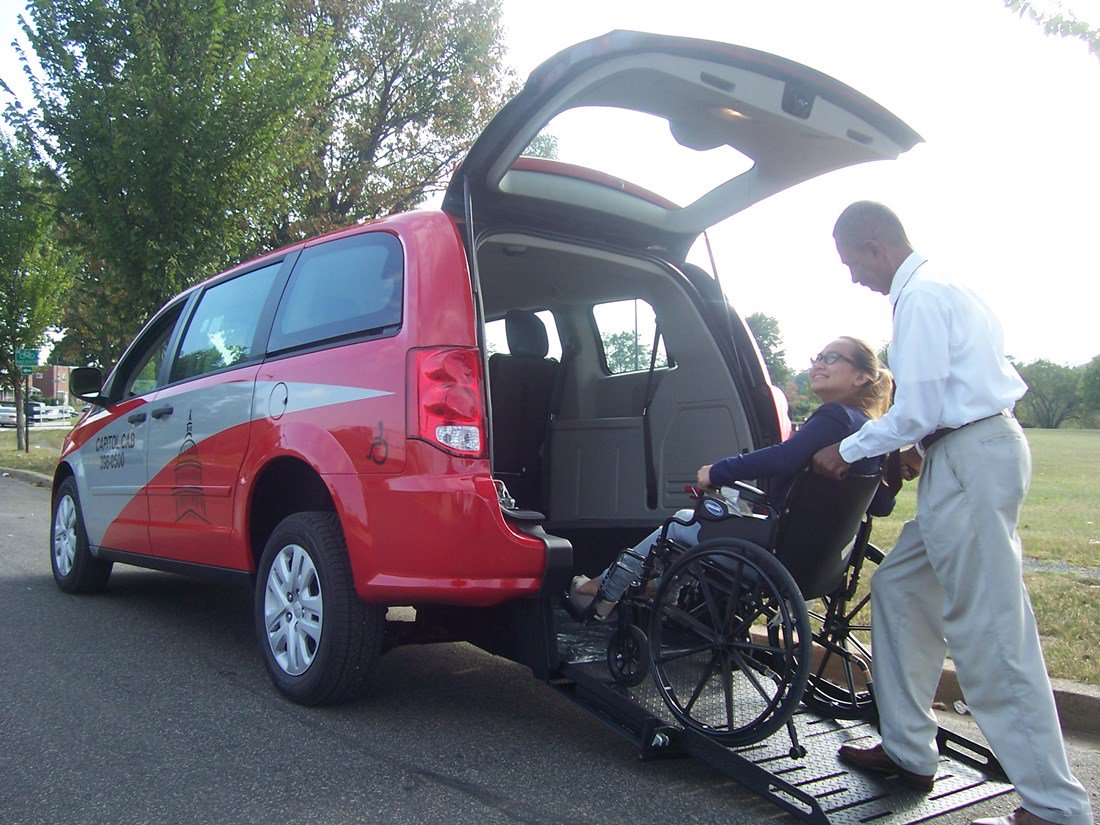
Several taxi companies across the region have vehicles equipped with ramps or lifts to serve persons who use wheelchairs and mobility devices. (MWCOG)
Representatives of taxi companies, paratransit providers, and public transit agencies from across the region convened on June 29 to discuss the future of providing mobility services to transportation disadvantaged individuals in the Washington region, especially older adults and persons with disabilities.
The annual gathering, hosted by the TPB, is an opportunity for private providers to engage with the local and state agencies responsible for providing public transportation services, including specialized services for transportation-disadvantaged individuals.
Transit agencies are using taxis to help provide paratransit services, but they’re facing challenges
This year’s forum kicked off with a presentation of recent research focused on how transit agencies work with taxi companies to provide paratransit services for persons with limited mobility. The presentation included results from a survey of transit agencies around the United States.
KFH Group’s Elizabeth Ellis, who led the survey and presented the results, told forum attendees that 39 of the 45 transit agencies surveyed use taxi-based programs. More than 90% reported working with taxi companies that have wheelchair-accessible vehicles in their fleet. Among the advantages of working with private taxi companies, agencies said, is that it helps improve overall cost efficiency and helps provide additional capacity when trip requests from passengers surge.
But agencies are facing challenges, Ellis said. Many reported a need for greater oversight and monitoring of taxi-based programs, in part to ensure a minimum quality of service. About as many also reported a need for more wheelchair-accessible taxi vehicles to meet demand.
MORE: Get Ellis’ full presentation of survey results
Ellis also touched on the emerging challenge of “transportation network companies” (or TNCs) like Uber and Lyft competing with traditional taxi services. Of particular concern is the competition for drivers and the effect this might have on the ability of taxi companies to continue partnering with agencies to provide paratransit services.
Ellis stressed that TNCs so far have been unable to guarantee the equivalency of service that is required of transportation providers under the Americans with Disabilities Act. She said that as long as TNCs are unable to provide such guarantees of service they are not sufficient substitutes for the mobility services required under ADA and provided by taxi companies operating accessible vehicles.
Rideshare company “Split” offers a different take on transportation in DC
The other main presentation at the June 29 forum was an overview of Split, a relatively new TNC operating in portions of the District of Columbia.
Split founder and CEO Ario Keshani was on hand to explain the company’s shared-ride model, which chains together the trips of multiple passengers traveling in the same general direction. He said the aim is to provide a service that is faster than public transit but cheaper than direct A-to-B, sole-rider services like Uber.
 Split is a new ridesharing service in DC. Split founder CEO Ario Keshani attended a June 29 TPB forum to give an overview of the company and its business model. (Split)
Split is a new ridesharing service in DC. Split founder CEO Ario Keshani attended a June 29 TPB forum to give an overview of the company and its business model. (Split)
Keshani emphasized that what sets Split apart from other rideshare companies is a focus on trip efficiency. One way Split does this is by asking passengers to walk to nearby thoroughfares or one-way streets to optimize trip routing. He said that this and several other efficiency strategies allow drivers to provide as many as 50% more trips per hour than the average Uber or Lyft driver, and more than twice the number of traditional taxi cabs.
Some forum attendees questioned Keshani’s trip-per-hour claims. They also asked whether Split is planning to add wheelchair-accessible vehicles to its fleet and whether it has policies in place to ensure that passengers in underserved areas can use the service. One attendee asked whether Split drivers are technically Split employees or independent contractors, which would affect the drivers’ and company’s liability in the event of lawsuits.
MORE: Get Keshani's overview presentation
Keshani said that there are not any plans to add accessible vehicles. He said that Split drivers do not have the ability to pick and choose the trips they make based on the requested pick-up or drop-off location, which he said should help ensure service in underserved areas. And he said that drivers are currently independent contractors, though the company is looking at other possible arrangements.
The meeting of taxi companies and transit agencies concluded with a roundtable report-out from the transit agencies about recent or planned service changes and other transit-related news from their respective jurisdictions. A dozen or so agencies participated in the roundtable portion of the forum.
Get the agenda and presentations from the June 29 forum